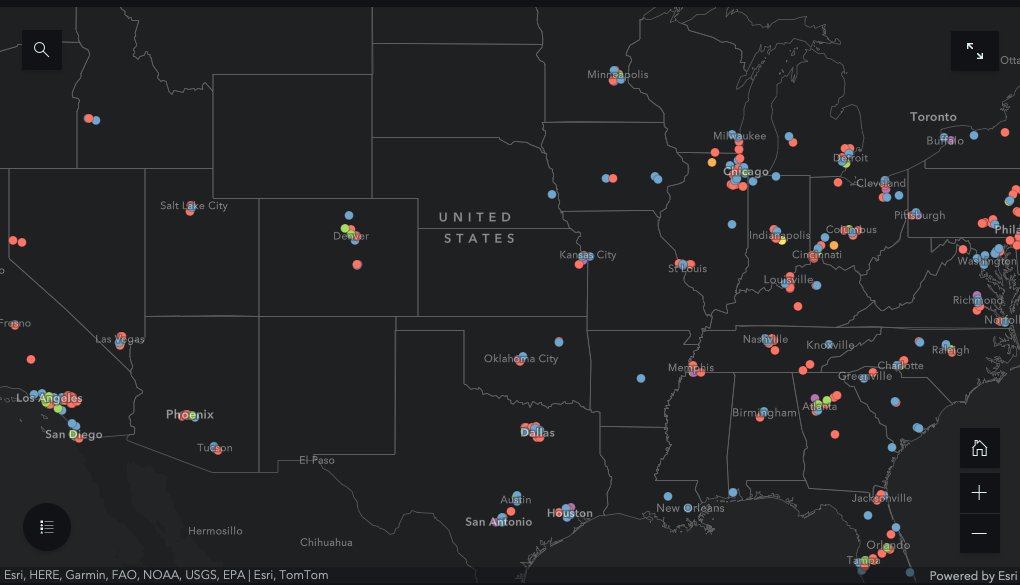Yes, the losing vote in Bessemer is a sign of a failed campaign. But it& #39;s also confirmation that workers are up against one of the most voracious corporate giants in the world & their strategies have to exceed relying on a business union to run elections warehouse-by-warehouse:
The logistics industry is built on supply chain flexibility. Amazon structures delivery routes so that it can circumvent locations where stoppages (weather; strikes) occur. Redundancies mean shop by shop elections are doomed; since Amazon can snake around & avoid union facilities
But there are chokepoints, if you think beyond the site-by-site approach. Here is a map of Amazon warehouses. Note big clusters around metro regions. if workers can build enough power across a metro region, they can shut down delivery across an entire area, vs. in one shop.
For e.g, German Amazon workers have legally recognized unions. When they go on strike, Amazon reroutes through FCs in Poland, undercutting bargaining power. But! Recognizing this, German workers starting supporting Polish organizing efforts, creating Amazon Workers International.
Recently, Amazon shut down DCH1, the stronghold and birthplace of Amazonians United. Instead of seeing this as a defeat, AU DCH1 turned into @AUchicagoland; their dispersed organizing committee is now growing new seeds in other DCs.
Beyond geographical strategy, though, what makes Amazonians United& #39;s model dope is that they haven& #39;t taken legal recognition as the precondition for organizing; they built militant minorities from the ground up first. This took time. Years.
As this @rampant interview with comrade Zama put it, "you become a union by fighting, not that you start a union in order to fight." It& #39;s a reminder that chasing cards is limited if transforming & building power from below is not central to your strategy https://rampantmag.com/2021/03/primed-for-struggle-organizing-inside-amazon/">https://rampantmag.com/2021/03/p...
We already knew that Amazon would spend millions on an anti-union, misinformation campaign. It shouldn& #39;t be a surprise that they have the entire apparatus of the state on their side. Against that edifice, building worker solidarity is a very difficult, painful, slow task.
We are working agnst decades-long neoliberalization; workers are more inclined to see themselves as entrepreneurs than having interests as a class (see @BLMcKean on this). This means Amazon& #39;s insistence tt they provide good jobs at good wages, was always more likely to appeal.
To transform workers& #39; stake in taking the risk of solidarity, you can& #39;t change just change their ideas. You have to change their experiences. This is why a campaign built on snazzy social media campaigns appealed more to left activists than to workers as a class.
If, as @thenation& #39;s postmortem suggests, the folks organizing at the plant gate at shift change were -not- workers themselves but paid union staff and supporters, then you have a bad strategy. Nobody appeals to your interests more than a fellow worker. https://www.thenation.com/article/activism/bessemer-alabama-amazon-union/">https://www.thenation.com/article/a...
All this said, union campaigns are very very very hard work to win. They are harder when you& #39;re up against a company whose logistics structure and corporate power is formidable. They are nearly impossible given current legal parameters. h/t @Hewniverse
My one hope is that the defeat will not mean the end of organizing at Bessemer. I hope organizing committees rise up across the south, workers continue to organize on the shop floor, build experiences of winning small campaigns, and get ready for the long road ahead.
All these lessons, I learned from Amazon workers salting at their warehouses and taking the time needed to transform their FW& #39;s experiences of solidarity. Shoutout to the badass Mofos at Amazonians United across Turtle Island.

 Read on Twitter
Read on Twitter


